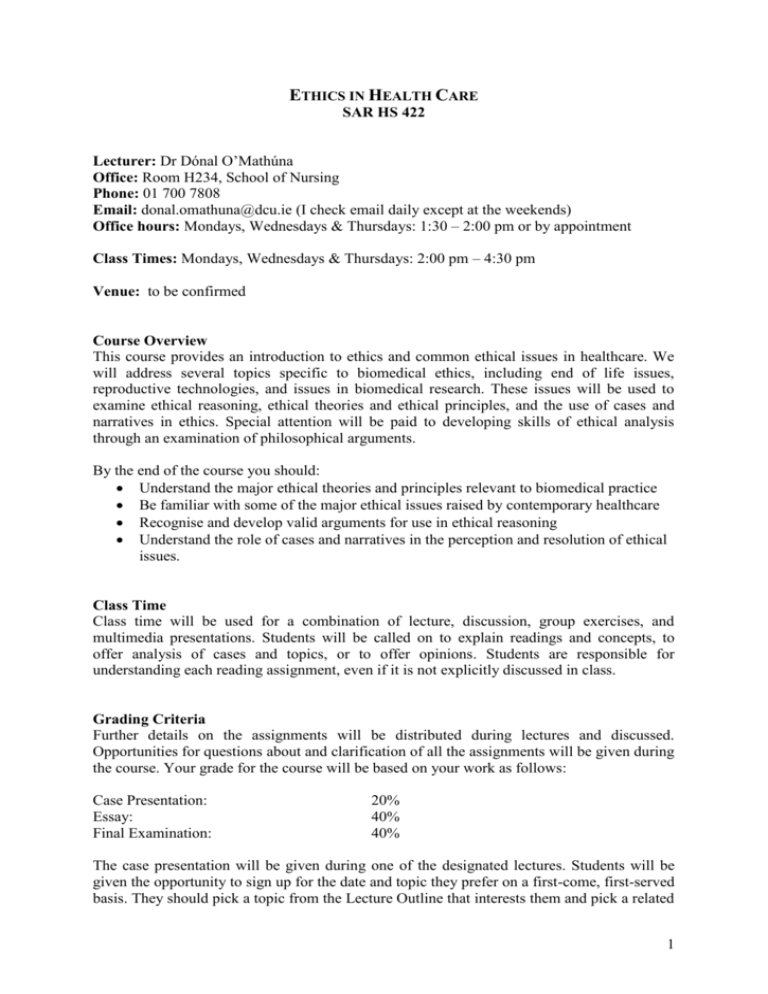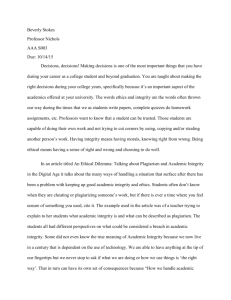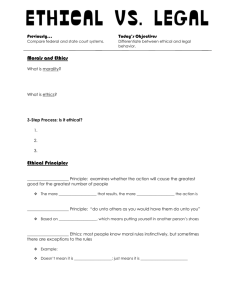Syllabus - Boston University
advertisement

ETHICS IN HEALTH CARE SAR HS 422 Lecturer: Dr Dónal O’Mathúna Office: Room H234, School of Nursing Phone: 01 700 7808 Email: donal.omathuna@dcu.ie (I check email daily except at the weekends) Office hours: Mondays, Wednesdays & Thursdays: 1:30 – 2:00 pm or by appointment Class Times: Mondays, Wednesdays & Thursdays: 2:00 pm – 4:30 pm Venue: to be confirmed Course Overview This course provides an introduction to ethics and common ethical issues in healthcare. We will address several topics specific to biomedical ethics, including end of life issues, reproductive technologies, and issues in biomedical research. These issues will be used to examine ethical reasoning, ethical theories and ethical principles, and the use of cases and narratives in ethics. Special attention will be paid to developing skills of ethical analysis through an examination of philosophical arguments. By the end of the course you should: Understand the major ethical theories and principles relevant to biomedical practice Be familiar with some of the major ethical issues raised by contemporary healthcare Recognise and develop valid arguments for use in ethical reasoning Understand the role of cases and narratives in the perception and resolution of ethical issues. Class Time Class time will be used for a combination of lecture, discussion, group exercises, and multimedia presentations. Students will be called on to explain readings and concepts, to offer analysis of cases and topics, or to offer opinions. Students are responsible for understanding each reading assignment, even if it is not explicitly discussed in class. Grading Criteria Further details on the assignments will be distributed during lectures and discussed. Opportunities for questions about and clarification of all the assignments will be given during the course. Your grade for the course will be based on your work as follows: Case Presentation: Essay: Final Examination: 20% 40% 40% The case presentation will be given during one of the designated lectures. Students will be given the opportunity to sign up for the date and topic they prefer on a first-come, first-served basis. They should pick a topic from the Lecture Outline that interests them and pick a related 1 case from the Dooley and McCarthy book or another other source that brings an Irish dimension to the topic (e.g. Irish newspapers). Students will be asked to identify the core ethical issues in the case and explain how two different ethical theories would address those issues. The presentation should last 10-15 minutes and students should submit a brief, written summary of the presentation which will be graded, along with the presentation itself. The topic for the essay will be chosen by each student. It should be an ethically controversial topic and the essay should develop the arguments for and against the issue. The essay must incorporate relevant ethical theories and principles. Detailed guidelines for the essay will be given during the course. All essays should be submitted on Monday October 6. Students are welcome to discuss their essay topic and ideas with the lecturer, but program policies do not permit drafts to be read by the lecturer. The final examination will consist of a small number of questions which will need to be answered in essay format. Again, details will be distributed closer to the time. Late assignments will be deducted 10% per day unless prior arrangements are made and documentation submitted to support the extenuating circumstances (doctor’s note, etc.). Required Texts: Dooley, D. and McCarthy, J. 2012. Nursing ethics: Irish cases and concerns. 2nd edition. Dublin: Gill and McMillan. O’Mathúna, D. P. 2009. Nanoethics: big ethical issues with small technology. London: Continuum. Brown, C. 1954. My left foot. London: Vintage. Additional readings will be distributed in class or made available online. Plagiarism: It is every student’s responsibility to read the Boston University statement on plagiarism, which is available in the Academic Conduct Code. Students are advised that the penalty against students on a Boston University program for cheating on examinations or for plagiarism may be “…expulsion from the program or the University or such other penalty as may be recommended by the Committee on Student Academic Conduct, subject to approval by the Dean.” Note: Students must retain an electronic copy of all essays submitted for assessment. 2 3







